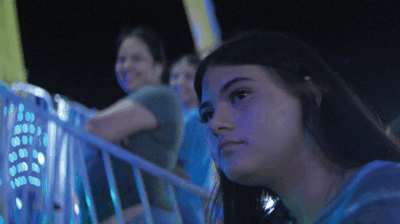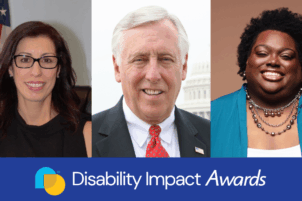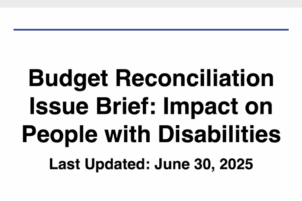“I know my words carry power.”
SPEAK. follows five high school students as they prepare and compete in one of the world’s largest public speaking competitions. Viewers learn the stories of Noor, Noah, Sam, Mfaz, and Esther, the two-time reigning national champion in the Oratory division.

SPEAK. is at times electric and at others contemplative, inviting reflection as well as moments of bold, unrestrained energy. Although Disability Belongs™ often reviews films that are centered around disabled protagonists or plotlines, SPEAK. is not, at its core, a story only about disability. Teenage orators share stories about LGBTQIA+ equality, gun safety legislation, war in the Middle East, and more. The beauty of the disability representation in this film is that it is so natural, because it’s simply part of what makes several students who they are.
Noor’s younger brother has Lennox-Gastaut Syndrome. He cannot speak and has limited mobility and life expectancy. Noor’s speech centers on the humanity and ordinariness of disabled individuals and those who love and care for them.
“Popular movies like My Sister’s Keeper and required reading like Of Mice and Men have convinced our society that I must see my brother as a burden,” Noor rehearses in her family’s barn while tending to one of her show pigs. “It is time to expand our vision and appreciate the multiplicity of experiences of individuals with disabilities and their loved ones.”
Noor offers a candid perspective on caregiving and advocacy, challenging common misconceptions: “Caregivers don’t need to be perceived as saintly. There’s no reason why people should be pitied or glorified for just taking care of a child. Pitying individuals with disabilities is disempowering.”
Her words push back against narratives that paint caregivers as heroes and disabled people as objects of pity, emphasizing respect and dignity instead.
She stresses the importance of using thoughtful language when discussing disability: “It’s okay to wonder, but language matters. Try asking things like, ‘What has it been like growing up together? How does Noah’s condition affect him?’”
In that same scene, Noor also encourages advocacy and education, saying, “There are many ways to advocate or educate. After this tournament, check out resources like RespectAbility (since rebranded as Disability Belongs™).”
Noah lost his mother to suicide several years ago. He describes it as a decision made “through the lens of depression and mental illness, which skewed her judgment.” Noah’s speech doesn’t shy away from pain or controversy. It’s a call to face uncomfortable truths about mental illness and suicide and to build a world where choosing to live feels more possible than the alternative.
Over the course of the film, viewers also discover that Noah is autistic, a fact that his mother concealed from him during her life. “It’s hard to imagine my life without speech and debate,” Noah explains while reflecting on finding out his diagnosis. “I wouldn’t have been able to get out there and make friends. I’d be a very different person, I’ll put it that way.”
For both Noor and Noah, original oratory allows them to advocate for their deeply held beliefs, process complex emotions, tell their stories, and grow as individuals. “If you would have told me a year ago that she would even be competing in speech, I would have laughed,” Noor’s mother, Deborah, recalls. “She could not have a conversation with more than a few people at a time without having an anxiety attack, and now she’s all grown up.” Together, their stories illustrate how oratory also provides support in managing the challenges of their neurodivergent conditions, empowering both Noah and Noor to find their voices with confidence and strength.
While Noor and Noah’s stories center on disability and neurodivergence, SPEAK. also showcases other young orators tackling complex and timely social issues: challenging nostalgic myths, confronting conflict and exclusion, and questioning narratives that shape public policy. Together, their speeches form a vibrant tapestry of youth activism, demonstrating the many ways young people are demanding to be heard and pushing for change.
The film weaves seamlessly between dynamic competition footage and reflective voiceovers from the students, their coaches, and family members. SPEAK. shows how oratory is a powerful tool for advocacy and personal growth, highlighting speech and debate as important building blocks for future actors, directors, politicians, and even Supreme Court Justices. It draws viewers in and, in some cases, may inspire them to take a public speaking class or step up to a local open mic night themselves.
SPEAK. is a testament to the courage and resilience of young people finding their voices in a world that often silences them. Through their speeches, Noor, Noah, and their peers remind viewers that speaking out is a powerful act of resistance, healing, and hope. This film is a vivid reminder that when young people SPEAK., the world must listen.
Following its world premiere at the 2025 Sundance Film Festival, SPEAK. is set to have its Washington, D.C., premiere at the DC/DOX Film Festival on Friday, June 13th, 2025.







